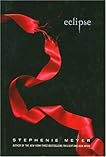 Eclipse by Stephenie Meyer
Eclipse by Stephenie MeyerMy rating: 1 of 5 stars
See Twilight Post Part I for context explanation.
In Eclipse, we have the continuing issue of people, particularly men, undermining and re-naming Bella’s experience. She is repeatedly told, “You don’t feel that” “Don’t be silly” “You’re being oversensitive” “Don’t freak out”. What is worse, however, is that by this third book, Bella rarely needs to be told this by others, because she does it for herself. We see Bella compartmentalize her feelings before she has a chance to feel them. Every action she takes is out of a misguided sense of protection for other people’s reactions and feelings. She equates telling the truth with hurting others. She continually (Literally) asks others to punish her rather than forgive her when she says what she feels and it disappoints them. She looks for ways to bleed for others rather than acknowledge how they have manipulated, coerced or betrayed her. She blames herself for any “selfish” feeling regarding her own experience, but refuses to let others apologize, even when their behavior borders on abusive.
As a woman, hurting someone’s feelings is the most selfish crime one can commit. Better to remain silent than suffer the guilt after telling someone a truth they will not like hearing. If someone says you’re being oversensitive or silly, believe them. Others know what you’re feeling better than you do. A woman should never put a man in a position where he has to watch her cry, be angry or show any other emotion beyond compliance. If you do this, you are a selfish monster and don’t deserve to be loved.
That’s Book Three.
View all my reviews >>

4 comments:
Shit. It makes my stomach roil just to read your reviews. Now that you have gone through the torture of reading these books, I (thankfully) won't have to.
This is really scary to me. I am an avid reader of YA fiction, and I know how easy it is to become emotionally involved in the story. I know a teenage girl who is a big fan of the Twilight books and movies. The adults in her family have never had health relationships, and she is probably especially vulnerable to the dysfunctional message of the books.
Now that I think about it, maybe I should read them so I have a basis for conversation.
I find the books' themes an interesting contrast to Abarat,another series with a teenage girl for a protagonist. While decidedly dark, the books portray the empowerment of the young woman.
thanks Pedro-
I'd say there's definitely a difference to reading them than just hearing about them. Part of this work is that I want to be able to understand what so many women and girls love about these books, and to be able to talk about it without alienating them or making them feel judged. That's what keeps me reading- wanting that basis for conversation to be rooted in the stories, not just the hype.
They are worth investigating, if just for that purpose.
Great point about reading vs. hearing about.
Have you talked to any guys who have read them? I'm wondering how my perception will be colored by my gender.
NPR had a review by a man saying why guys should like Twilight, but from what I recall, it was for pretty lame reasons. I definitely think Meyer's books tap into some unhealthy feminine unconscious, but I don't think it would be hard as a man to recognize the inherent misogyny. But I would be very very curious what your experience would be.
I do have a male friend who loved reading them as a guilty pleasure, but his review pretty much lines up with mine, except that I can't seem to enjoy them at all.
Post a Comment